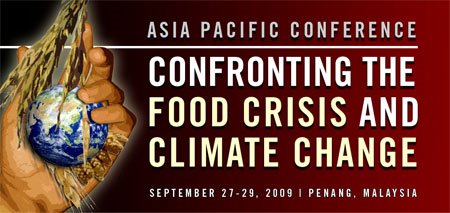Asia is particularly vulnerable to the climate crisis. According to the UN, Asia is the region most affected by natural disasters, almost 70% of which are climate-related. We have been experiencing the effects of climate change in the form of erratic rainfall, unpredictable flooding, rising sea levels, storms and hurricanes, droughts, rapid snow melt, mudslides and other climate variations. All of this is affecting our food production, its diversity and the quality of our crops and seeds. In fact, the majority food producers – small peasants, fisherfolk, pastoralists and gatherers - are the worst sufferers from the effects of climate change.
In the international discussions and agreements on climate change, agriculture has been identified as one of the causes of climate change. What do you think about this? Are small farming systems based on low- or no-chemical inputs contributing to climate change? If the answer is no, then we need to speak out. We need to emphasize that high input, chemically intensive, export-oriented agriculture is leading to cash crop monocultures and adding to the problems of climate change.
In fact, industrialization of agriculture has been adding to the climate crisis in several ways: through the establishment and operation of chemical-producing and polluting factories and through extensive fossil fuel-based road, air and sea transportation to carry both agriculture inputs and outputs (food products) over long distances (known as food miles). It is clear that if we wish to address the climate crisis, we need to have less corporate agriculture. But what is the alternative?
Biodiversity-based ecological agriculture (BEA), local food production and local consumption are practical solutions for mitigating as well as adapting to the climate crisis. These practices release lower amounts of greenhouse gases and allow the soil, water and air to recoup. Consumption of locally produced food minimizes transportation costs – both in terms of money and food miles. Moreover, locally and ecologically produced food is fresh, healthy and nutritious, and provides livelihood options for small food producers. Overall, this helps build community resilience against the impacts of climate change on food and the economy.
What are your thoughts on agriculture and the climate crisis? How should we address these problems? What are some strategies for promoting BEA and local food consumption? How can we promote safe, healthy, local food and link it to national and international advocacy initiatives?
Do you think people are becoming more concerned about the food they are eating and how it is reaching them? Do you feel the need to promote healthy local food availability? Do you feel it necessary to tell people what eating packaged food from the supermarket really means? Do you notice people missing some old food habits and items which have either been lost or are difficult to find, which need to be revived? Perhaps some traditional and local crops which were tasty and nutritious or were possible to grow in arid or flood conditions even? Do you think local food consumption would help local food producers? Is there a need to bring local food producers and consumers together?
Are you doing anything about it?
Please post your thoughts, comments, concerns and ideas. We’d welcome on this blog any information from your region – on climate change impacts, local resilience initiatives, ecological agriculture, safe food habits, local food traditions lost that need to be revived, including photographs.
Tuesday, August 25, 2009
Subscribe to:
Post Comments (Atom)


No comments:
Post a Comment